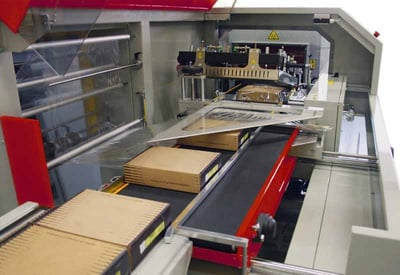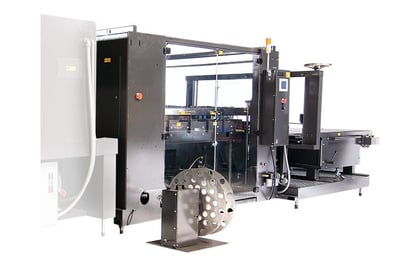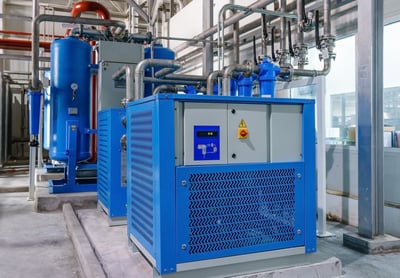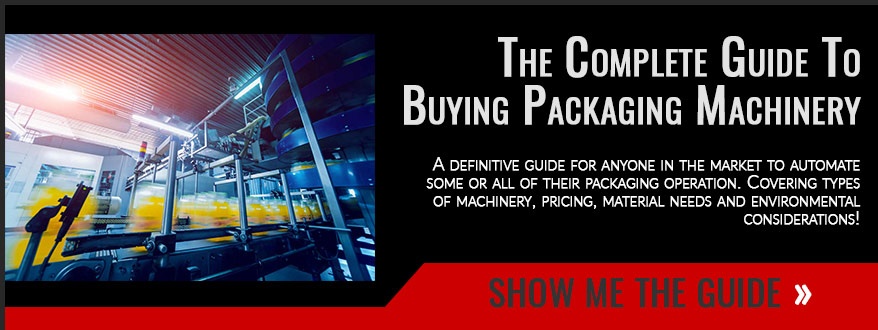Electric VS Pneumatic Sealers: Which Is Better?
You have been researching sealers for a few months now and you have decided that you would like to purchase one.
You have educated yourself on the cost and the expected ROI of purchasing a sealer. You have studied the differences between buying VS leasing your new sealer and have found the option that is right for your company. If you haven't already done these things, we'd recommend you doing so.
You spoke with a repair technician and are working out all of the necessary details of a preventive maintenance program to make sure that your machinery will run well, minimizing downtime.
You have your key performance indicators set up in regard to your sealer's operation and you have made it a point to ensure that your machine operators are trained on all safety protocols.
This project has cost you a lot of time, effort, and money to get to this point. You are ready to actually buy a machine now.
You have selected a vendor to purchase materials, service, and repair from and are 100% prepared to take the next step.
But, you have one more question that needs answering. Should you buy an electric sealer or a pneumatic model?
You are unsure about the difference between these machines and you need to be absolutely confident that you are making the right decision for your business.
You need a machine that will get the job done quickly and efficiently, however, you also must ensure that you are getting a machine that does not have unwarranted additional costs. So, you are not exactly sure how to move forward.
Well, we have some great news! You have found your way to this article and you are looking for an answer to your final question. And luckily for you, we have it!
Industrial Packaging has been selling sealers for a very long time and we are a thought leader in our industry. As such, we are going to assist you in choosing the perfect machine for your needs.
In this article, we will compare electric sealers to pneumatic sealers and help you in the last steps of choosing the best piece of equipment for your packaging line.

Comparing Electric And Pneumatic Sealers
Electric Sealers
Electric heat sealers are a modern version of sealers. Several different brands offer electric heat sealers in a variety of makes and models from entry-level machines to fast, fully automatic models.
When buying an electric sealer, cost savings are a big motivator. One reason for consumers to buy an electric machine instead of a pneumatic model is that electric models don't need air or an air compressor to function properly.
As pneumatic sealers require the use of an industrial level air compressor it should be noted, Industrial level air compressors cost (on average) $5,000 - $10,000! Additionally, compressed air is one of the most expensive utilities in a plant.
Pneumatic Sealers
There are very few major differences between electric and pneumatic sealers. The only real difference is that pneumatic machines require an industrial level air compressor.
All sealers need a way for the sealer to have the jaws come together and seal the film. Pneumatic sealers require air cylinders to make this happen. These air cylinders that wear over time and need to be replaced.
Oftentimes as they become more unreliable, operators increase the size of the bag around the package to make up for this. This results in wasted time, money, and materials.
As pneumatic sealers require the use of an industrial level air compressor it should be noted, Industrial level air compressors cost (on average) $5,000 - $10,000! Additionally, compressed air is one of the most expensive utilities in a plant.
Need Help Buying Packaging Machinery?

Which Is Better, Electric Or Pneumatic Sealers?
Honestly, the only major difference between an electric sealer and a pneumatic sealer is that the pneumatic sealer requires an industrial air compressor to pump compressed air.
By selecting an electric sealer over a pneumatic sealer, you can save around $5,000 - $10,000 on the machinery itself. Beyond that, you can save thousands of dollars more on the utility costs of compressed air.
We strongly recommend using electric sealers for this reason. But there are some situations where a pneumatic sealer might be preferred for you.

Sometimes a company has signed a contract to source all their equipment from one vendor exclusively. Agreements made between the company and their vendor may provide other cost savings that have been negotiated to balance out or negate the savings attributed to using electric rather than pneumatic machinery.
Additionally, some operators simply prefer the feel of a pneumatic machine versus that of an electric. Depending on the budget of the company, they may opt to purchase more expensive machinery that suits their operator’s preferences better.
Where To Buy Your Sealer
Regardless of which type of sealer you ultimately decide on, your next step is to purchase the machine. As you have already done all your homework and know what machine you want, you simply need to choose a vendor to purchase the equipment from.
Here are a few different types of vendors that you will want to consider buying from based upon your specific needs as a consumer.
Packaging Distributors
Industrial Packaging is a packaging distributor. Vendors like us are a common choice for buying sealers. A big reason that clients choose packaging distributors is that they have products from many manufacturers.
What does this mean for you?
Because packaging distributors aren’t limited to a single brand, typically you can count on them to help you choose the best sealer for the products you are packaging.
Manufacturers
Another common option for sourcing your sealers is using a manufacturer (OEM). Manufacturers usually have highly knowledgeable packaging experts who are trained exclusively on the types of sealers they produce.
In some cases, manufacturers will have the best resources for the brand they represent because they are experts with specific knowledge of the heat sealers that they themselves make.
Many manufacturers are gigantic companies and they will always have a ton of unique information about their products and what makes them unique.
It is very important to remember however, not all manufacturers will sell directly to you. You may very well have no other choice but to purchase their brand of packaging machinery elsewhere.
Next Steps To Buying Your Sealer
If you are still not exactly sure how you wish to proceed in completing your journey to purchasing the perfect sealer for your business and would appreciate further guidance, please reach out to one of our packaging experts.
They will be able to analyze your current equipment, materials, KPIs, protocols, and processes and advise you on the exact type of sealer that is correct for your environment.
They will also be able to help you source materials and preventative maintenance for your machinery, even if we are not the best fit for you as a vendor, we will be able to point you to whoever is.
Industrial Packaging has been selling stretch wrappers for decades, as such, we are in a unique position to help you buy the right machine for your needs, even if you do not ultimately buy that machine from us. It is our mission to serve you and provide you with the best choice for your company's success.
About Nathan Dube
As the Digital Marketing Specialist at Industrial Packaging, I am honored to create content for such a phenomenal company and work with one of the greatest teams in the Packaging Industry. Whether creating a video, writing blog posts or generating other pieces of content and multimedia, I am always excited to help educate and inspire our prospects and clients to reach their highest potential in regards to their packaging processes and needs.




